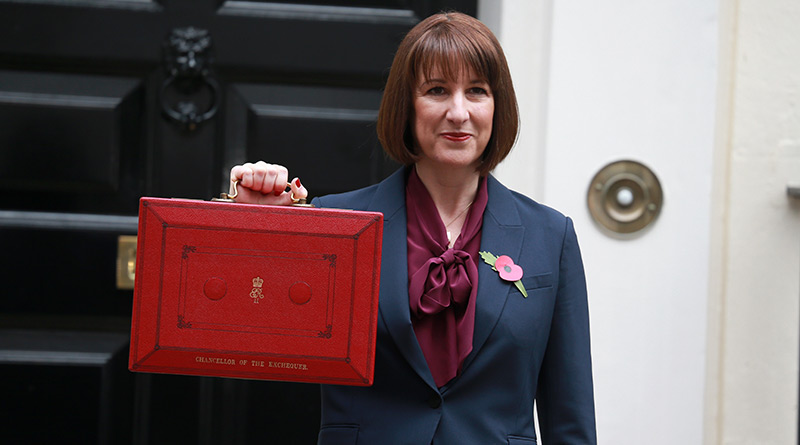Sector Leaders Respond to Chancellors “Disappointing” Budget

Sector leaders have expressed disappointment at Chancellor Rachel Reeves budget which they say will result in a 140% Tax Rise For 250,000 High Street Firms Next April
According to the commercial real estate intelligence firm Altus Group the average business rates bill for pubs will increase from £3,938 to £9451. Restaurants will see their average bill rising from £5,051 to £12,122.
The reduction of the business rates discount for retail, hospitality and leisure firms in England from 75% to 40% from 1st April for the 2025/26 financial year will mean an average 140% rise in business rates bills for more than 250,000 high street premises in England next April, experts have today warned.
The Chancellor also announced an increase employer national insurance contributions which will rise from 13.8% to 15% and a reduction in the threshold at which employers start to pay NI from £9,100 to £5,000.
Ms Reeves also announced a 1.75% reduction in beer and cider duty for draught products from February 2026 which means 1p off a pint.
 BII Licensee of the Year 2024 winner, Justine Lorriman, Owner and free trader, The Royal Dyche, Burnley said: “I feel the Chancellors quote ‘a penny off a pint’ is a compete insult to the hospitality industry. The sector has just been hit with so many increases, and seeing the house cheer when this was announced, shows just how out of touch they are.
BII Licensee of the Year 2024 winner, Justine Lorriman, Owner and free trader, The Royal Dyche, Burnley said: “I feel the Chancellors quote ‘a penny off a pint’ is a compete insult to the hospitality industry. The sector has just been hit with so many increases, and seeing the house cheer when this was announced, shows just how out of touch they are.
“As for the reduced Business Rate Relief from 75% to 40% – this will cost many pubs thousands of pounds. The National Living Wage and NI increasing for employers was expected, but not on the scale that it has been increased to.
“It will be a waiting game now to see how much packaged and spirits increase from breweries and wholesalers with the duty increasing on non-draft products.
“Disappointing to say the least!”
 John Webber Head of Business Rates at Colliers commented, “The Chancellor’s announcements concerning business rates today were desperately disappointing. Despite pre-election promises of business rates reform, nothing of significance was announced. There is to be no consultation, just a discussion document, and the measures announced hardly put a sticking plaster over the gaping wound rather bringing in any fundamental reform.”
John Webber Head of Business Rates at Colliers commented, “The Chancellor’s announcements concerning business rates today were desperately disappointing. Despite pre-election promises of business rates reform, nothing of significance was announced. There is to be no consultation, just a discussion document, and the measures announced hardly put a sticking plaster over the gaping wound rather bringing in any fundamental reform.”
“Far from heading off a cliff edge, the Chancellor’s measures potentially are driving the sector to the wall . By replacing the current 75% discount to business rate bills, with a discount of 40%, those businesses currently eligible for the relief will see their business rates bills actually rise by a massive 140% next year.”
“Moreover in 2026/7, despite the two permanent lower multipliers for retail/hospitality /leisure, many businesses in the sector will still see their rates bills rise significantly as a result of the 2026 Revaluation.”
“Through discussions with the VOA we have also learnt that these measures, together with freezing of the smaller business rates multiplier, will be funded by introducing an even higher multiplier for larger businesses (those with an RV of over £500,000.) This will include businesses in the retail, hospitality and leisure sectors too.”
“So, the bigger businesses, the ones that actually create the jobs will be hit for six. I fail to see how any of these measures help the high street in the long term.”
“Like the government before her, the Chancellor has failed to tackle the business rates issue. There has been no pledge for business rates reform across the board, no attempt to freeze the larger multiplier or to bring it to a sustainable level that businesses can afford, nor to tackle the business rates deserts we see in some parts of the country, nor to reform the creaking appeals system.”
“ Far from saving the high street we have a potential disaster looming. “
 Kate Nicholls, Chief Executive of UKHospitality, said: “This Budget is the latest blow for hospitality businesses. Rising taxes, increasing costs and fragile consumer confidence risk bringing growth to a grinding halt.
Kate Nicholls, Chief Executive of UKHospitality, said: “This Budget is the latest blow for hospitality businesses. Rising taxes, increasing costs and fragile consumer confidence risk bringing growth to a grinding halt.
“In the short-term, the tsunami of employment costs coming in April will ultimately do more to hamper growth than incentivise it. Increases to employer NICs and wages will make it harder for businesses to support employment and invest in their businesses.
“Avoiding the business rates cliff-edge next April was critical and it was important that some relief has been extended. However, the reduced level of 40% is another cost that businesses have to deal with. For those small- and medium-sized operators, their rates bills will still go up in April.
“All of this means that 2025 will be painful for hospitality, with an increased annual tax bill of £3 billion for the sector.
“However, there are reasons for longer-term positivity. I am pleased that the Chancellor is implementing UKHospitality’s recommendation for a permanently lower level of business rates for hospitality. Levelling the playing field in this way recognises the importance of the high street and the role it plays in our communities and economy.
“We need to see the detail and the Government must work with the sector in the design and delivery of this significant change to get it right.”
 Nick Mackenzie, CEO of Greene King, said: “Despite a glimmer of hope on the horizon for business rates reform in 2026, the layering of substantial costs on pubs next year is going to leave businesses with difficult choices around investment, prices and hiring.”
Nick Mackenzie, CEO of Greene King, said: “Despite a glimmer of hope on the horizon for business rates reform in 2026, the layering of substantial costs on pubs next year is going to leave businesses with difficult choices around investment, prices and hiring.”
“The importance of the pub and brewing sector, which employs more than one million people and invests £2bn a year in communities across the UK, cannot be underestimated. While a reduction in draught duty is welcome, in reality it is a drop in the ocean compared with the cost impact of lowering the threshold for national insurance contributions and increasing the rate paid by employers.”
“I would urge the Chancellor to work with the industry to help reduce the cost of doing business as a matter of urgency, with the possible changes to business rates for hospitality in 2026 needing to happen sooner to end the unfair taxation of the nation’s locals.”
 Simon Dodd, CEO of Young’s, said: “We are pleased that the Government has decided to cut draft duty, which is a small step towards reducing the huge tax burden faced by our industry. Unfortunately, given the other measures announced today, there are many more snakes than ladders for the hospitality sector, a vital industry for the communities we serve and the country’s economy as a whole.”
Simon Dodd, CEO of Young’s, said: “We are pleased that the Government has decided to cut draft duty, which is a small step towards reducing the huge tax burden faced by our industry. Unfortunately, given the other measures announced today, there are many more snakes than ladders for the hospitality sector, a vital industry for the communities we serve and the country’s economy as a whole.”
“We support the Government’s move to increase National Living Wage. Paying our people well is really important to us as they are the lifeblood of our business. However, this needed to be balanced with support elsewhere, as there isn’t a magic money tree in the gardens of hospitality that can sustain a 6.7% increase in its cost base overnight. The cut in draft duty and business rate relief for next year hasn’t really touched the surface in offsetting this significant increase in cost.”
“The Chancellor says she wants to stimulate growth, so do we. We are pleased that the Government has listened and committed to support hospitality through reviewing business rates, but this needed urgent reform especially when costs are increasing substantially next year. The can has been kicked to 2026-2027 before we get certainty and real change. We need the Government to deliver on this promise, which has too often been swept under the carpet and ignored.”
 Andy Slee, SIBA Chief Executive said: “The Chancellor’s announcement that she will raise the draught duty discount was a positive step which shows a continued support for breweries and beer in pubs, which contribute greatly to local communities and economies. But with broader alcohol duty, business rates, wages and National Insurance contributions all going up pubs and breweries are going to be worse off overall.
Andy Slee, SIBA Chief Executive said: “The Chancellor’s announcement that she will raise the draught duty discount was a positive step which shows a continued support for breweries and beer in pubs, which contribute greatly to local communities and economies. But with broader alcohol duty, business rates, wages and National Insurance contributions all going up pubs and breweries are going to be worse off overall.
SIBA also welcomes the Government’s consultation on pub market access, which has the potential to improve the ability for small independent breweries to supply local pubs and we look forward to working with the Government and our colleagues across the industry to ensure this has a positive outcome which will improve consumer choice.”
 Ash Corbett-Collins, Chairman of CAMRA, the Campaign for Real Ale, said: “Despite general rises in alcohol duty next year, CAMRA is pleased to see the Chancellor’s decision to cut the rate of tax specifically on beer and cider served in pubs, clubs and taprooms. This will help pub goers as well as independent breweries and cider producers who sell more of their products into pubs, and recognises the principle that drinking in the community setting of the local pub is far preferable to the likes of cheap supermarket alcohol.”
Ash Corbett-Collins, Chairman of CAMRA, the Campaign for Real Ale, said: “Despite general rises in alcohol duty next year, CAMRA is pleased to see the Chancellor’s decision to cut the rate of tax specifically on beer and cider served in pubs, clubs and taprooms. This will help pub goers as well as independent breweries and cider producers who sell more of their products into pubs, and recognises the principle that drinking in the community setting of the local pub is far preferable to the likes of cheap supermarket alcohol.”
“The announcement of a new, lower rate of Business Rates for retail, hospitality and leisure businesses could be a gamechanger for pubs in England. If this is done right and we get a fairer rates regime which ends the system where our pubs are penalised with unfair bills, this would help save community locals up and down the country. “
“Until a new, fairer system is in force in 2026/27, we are pleased to see that discounts on business rates bills for pubs will be extended into the next financial year, albeit a lower 40%. However, the Treasury should monitor the impact that this reduction in support is having on struggling community pubs to make sure more businesses aren’t forced to close their doors for good.”
